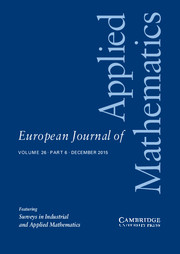Article contents
Existence results of solitons in discrete non-linear Schrödinger equations†
Published online by Cambridge University Press: 15 February 2016
Abstract
The discrete non-linear Schrödinger equation is one of the most important inherently discrete models, having a crucial role in the modelling of a great variety of phenomena, ranging from solid-state and condensed-matter physics to biology. In this paper, a class of discrete non-linear Schrödinger equations are considered. Using critical point theory in combination with periodic approximations, we establish some new sufficient conditions on the existence results for solitons of the equation. The classical Ambrosetti–Rabinowitz superlinear condition is improved.
- Type
- Papers
- Information
- Copyright
- Copyright © Cambridge University Press 2016
Footnotes
This project is supported by the National Natural Science Foundation of China (No. 11401121) and Natural Science Foundation of Guangdong Province (No. S2013010014460).
References
- 3
- Cited by


